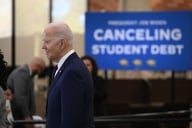You have /5 articles left.
Sign up for a free account or log in.
The Common Application is planning to let colleges add a question for applicants that some admissions leaders believe is unethical and will encourage more gaming of the admissions process.
The question: Where else are you applying?
The National Association for College Admission Counseling has long opposed such questions, arguing that they add to pressure on students and that colleges should be making their decisions on applicants based on their merits, not the odds of applicants enrolling.
"This may seem like a harmless question, but NACAC members have long supported the notion that students should be able to apply to colleges without being probed on the other schools they are considering," says an analysis of the issue by Todd Rinehart, associate vice chancellor and director of admission at the University of Denver and chair of NACAC's Admission Practices Committee. "The philosophy has always been that the college application process is stressful and complex enough, and we don’t need to add yet another layer to the tangled web by posing a question that puts the student in an awkward position. Does the student need to strategize a response to enhance their chance for admission, or should they flat-out lie? Nothing like colleges setting the table for some good old chicanery."
Rinehart stressed that his analysis represented only his views.
His analysis noted that concerns about how colleges would use the information are not hypothetical. Some colleges have used a similar question on the Free Application for Federal Student Aid to reject some applicants and to offer others smaller aid packages. The strategy (similar to that admissions officers could use with the Common Application question) is to determine how likely an applicant is to accept an offer and to punish those who may not enroll. Many applicants don't understand how this information can be used.
NACAC's ethics code specifically bars colleges from asking applicants the order of their admissions preferences (except in binding early decision programs in which applicants must enroll if admitted). It's also a "best practice" to not ask any questions about to which other colleges students have applied.
Rinehart writes in the analysis that he approached the Common Application, without success, after admissions deans raised concerns. Rinehart writes that Paul Mott, interim CEO of Common Application, "correctly" asserts that the NACAC ban applies technically only when people are required to list their other applications in order of preference. But Rinehart notes that this may be a minimal distinction since the experience of FAFSA shows that many applicants do list their other choices that way. Savvy applicants, of course, might provide answers that they think would help them.
In his analysis, Rinehart writes that Mott told him that members want Common Application “to butt out of the business of determining what information you collect on your application and, for that matter, how you make your admission decisions." And Rinehart says that Common Application is essentially telling NACAC, with its "beloved" ethics standards, "to get over it and move on."
In an email interview, Rinehart summarized why many admissions leaders who have reached out to him are upset.
"If this question is allowed, on the margins, I’m sure we would have some members and some prospective students both trying to game the system," he said. "But this issue is more about principle and doing the right thing for the best interests of students. I’m an optimist and believe that many colleges would probably use the information in an ethical and appropriate manner, but we should remove any conflicts of interest, and more importantly, remove any added pressures for students. Can you imagine shopping for a television and having the sales rep ask you where else you are looking? We would walk away and take our business elsewhere!"
Common Application did not respond to a question seeking its opinion on the issue.








